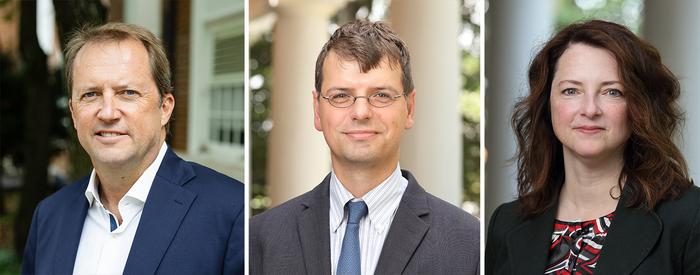Three prominent professors from the University of Virginia’s School of Engineering and Applied Science have recently been recognized for their groundbreaking contributions to the field of biomedical engineering. Scott T. Acton, Gustavo Kunde Rohde, and Shannon Barker have been inducted into the esteemed 2025 class of the American Institute for Medical and Biological Engineering (AIMBE) College of Fellows. This prestigious recognition is bestowed upon a select group of individuals who represent the pinnacle of excellence in medical and biological engineering, with only 2% of professionals in the field receiving such an honor.
Scott T. Acton, serving as the chair of the Department of Electrical and Computer Engineering, is known for his significant advancements in biomedical image processing. His innovative work integrates artificial intelligence and machine learning techniques to extract valuable insights from complex medical data. Acton leads the Virginia Image and Video Analysis group, which focuses on developing cutting-edge tools for researchers and clinicians. These advanced tools not only enhance the ability to analyze imaging data from various anatomical systems but also facilitate breakthroughs in understanding diseases such as Alzheimer’s, cancer, and cardiovascular conditions.
In his role at the University of Virginia (UVA), Acton has made profound impacts on the biomedical imaging landscape. By leveraging artificial intelligence, his research team effectively automates image analysis processes, significantly improving the tracking and understanding of diseases at the cellular level. Traditionally, such detailed analysis required extensive manual intervention, but Acton’s innovations have made this process more efficient and effective, allowing scientists to derive meaningful conclusions from imaging data that were previously difficult to interpret.
Moving to Gustavo Kunde Rohde, a professor who holds joint appointments in biomedical engineering and electrical and computer engineering, his contributions to mathematical modeling have significantly transformed our understanding of biological systems. Rohde’s pioneering work in transport-based nonlinear transforms has redefined how images and signals are analyzed within the biomedical community. By creating robust mathematical tools, he has empowered researchers to model complex biological phenomena, particularly in organ and tissue studies.
The implications of Rohde’s research stretch far beyond theoretical advancements. His methodologies have played a crucial role in understanding disease progression, particularly in areas like pathology, where automated image analysis is paramount for diagnosing and monitoring cancer. In addition to his research contributions, Rohde actively participates in shaping the biomedical imaging community through leadership roles in major conferences and journal editorial boards, further contributing to the advancement of this essential field.
Shannon Barker, recognized for her impactful work in transforming engineering education, adds a unique dimension to the trio’s achievements. As an associate professor and the associate chair for undergraduate programs in biomedical engineering, she advocates for a holistic approach to engineering studies that integrates human-centered design principles. Barker’s educational philosophy emphasizes empathy and real-world applicability, guiding her students in tackling humanitarian design challenges and addressing the needs of diverse patient populations.
Under Barker’s leadership, her students have engaged in projects that illustrate the social impact of biomedical engineering, such as devising solutions for healthcare in refugee camps. Her commitment to innovative curriculum design has fostered collaboration among faculty and has redefined how engineering students learn and interact with complex problems. By creating an inclusive and responsive learning environment, Barker prepares her students not only to become engineers but also to be leaders in their respective fields.
The induction into the AIMBE College of Fellows not only celebrates the accomplishments of Acton, Rohde, and Barker but also underscores the University of Virginia’s commitment to fostering a collaborative and interdisciplinary approach to engineering and biomedical sciences. Jennifer L. West, the dean of the School of Engineering and Applied Science, articulates that this recognition reflects the collective strength of their scholarly community. The shared mission among these faculty members is to enhance human health through innovative research, education, and leadership, making their contributions all the more impactful.
The formal induction ceremony took place at the AIMBE’s annual meeting held in Arlington, Virginia, marking a significant milestone in the careers of these distinguished professors. The recognition as AIMBE fellows is not merely an accolade; it serves as a beacon of excellence that inspires upcoming generations of engineers and researchers to pursue innovative, human-centered solutions to the challenges faced in medical and biological engineering.
As the field of biomedical engineering continues to evolve rapidly, the efforts of scholars like Acton, Rohde, and Barker are crucial in driving advancements in healthcare technology and education. Their pioneering contributions are paving the way for future innovations that will not only revolutionize medical imaging but also enhance the educational experiences of aspiring engineers. This dedication not only positions them as leaders in their field but also as vital advocates for the integration of technology in solving pressing health challenges.
In conclusion, the achievements of these three faculty members exemplify the impact of interdisciplinary collaboration in advancing the frontiers of biomedical engineering and education. The recognition by AIMBE underscores the importance of innovation and leadership in creating a healthier future through engineering solutions. As we look ahead, the continued commitment of these scholars to their research and educational endeavors promises to make a lasting difference in the lives of countless individuals.
Subject of Research: Biomedical Engineering Innovations
Article Title: UVA Professors Honored as AIMBE Fellows for Pioneering Contributions in Biomedical Engineering
News Publication Date: [Insert Date]
Web References: [Insert References]
References: [Insert References]
Image Credits: University of Virginia School of Engineering and Applied Science
Keywords: Biomedical engineering, medical imaging, artificial intelligence, image processing, education, mathematical modeling, disease progression, interdisciplinary collaboration, healthcare solutions, engineering education.




